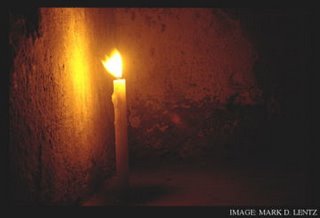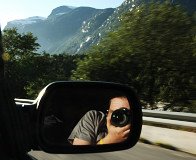Abubakar was a translator who I worked with while I was a photographer in The Gambia in 2000. We had a good friendship sometimes clouded with both of our unique cultural disillusion. On the weekend the pair of us went on adventures but this account took place one of the weekends I visited his compound. The dialogue of this piece is his account that I placed in an old journal that I used while in Africa. I re- read his vivid dialogue that I quickly scratched in that small candle lit room in West Africa

It is the time of West African night when fires start to dim and adults speak softly so the children can sleep. It is the time of night in The Gambia, when the mosquitoes come salvo after salvo against any bare-skin that they find. It is the time of night when Abubakar longs for Sierra Leone and like the stinging salvo of mosquitoes his soul is pounded by intense memories that challenge his rest, that challenge his being. Sadly, for Abubakar there is no mosquito netting for the soul.
Abubakar is a twenty-something Sierra Leonean trying to find his way in a foreign land. He is broad-shouldered and has a thick -muscular torso. Abubakar smiles through most of his days. He lives a chaotic life looking for jobs to buy food and pay the rent for his small little room. He is the only adult male who lives in his compound. His neighbors are mostly young children cared for by their young mothers and young grandmothers. Awa is the matriarch of the compound. Her eyes are kind but skeptical and when there is a disturbance within the compound her voice is the last voice heard. In the relational economy of the compound Awa is a mother figure to Abubakar and he is a strong male model for the young boys of the compound.
Awa...

The boys...

There is no remnant of sun in the hot, African air and Abubakar has wrangled the children up into the compound with a few shrill whistles alerting that it is time to come to bed. Most of the kids come quickly because they know that if Awa has to get them to come to bed it will be trouble. Some of the children depart each other for bed and brush closely past Abubakar too shy to hug him but in love with his kind strength and cannot resist respectful affection. The mothers stand in the doorways of the compound accounting for their youth and some mothers negotiate as some of their sons want to sleep over and the same for some of the girls. The children are not all siblings but they are brothers and they are sisters. Just as Abubakar is not their father but is. Abubakar yells into the next compound in Mandinka where some young adult males are blasting Rastafarian beats on speakers that sound like they will blow out any moment. Whatever Abubakar hollered quickly works and the night has become quiet.
Abubakar tells his story...

Abubakar shuffles down the outdoor covered walkway into his room. He lights a match and pulls a tall white candle from a strategic hole in the wall. He cups his hand and lights the candle and then holds the match to melt the wax on the bottom of the candle and he sets the candle on the floor. The hot wax quickly cools and the room has a steady and stable light source. Abubakar kicks off his thin worn flip-flops and crashes onto his sleeping mat. It looked like the lighting of the candle and the kicking off of the flip-flops is a daily ceremony for Abubakar. It is an unsaid ceremony into sadness. His smile is gone and his eyes no longer flicker joy but reverberate with agony. All the children of Awa’s compound are safe and peacefully resting but Abubakar is not sure of the state of his own mother and sister.
Abubakar is restless and cannot lie down. He sits on his mat with his back to the wall. The wall holds him up because the wait of this moment of worry is heavy. Abubakar is stilled in deep thought but the air around him is restless with unsaid fear. Abubakar’s voice ends the silence, “Innocent people are dying for nothing.” And so Abubakar began the personal history of Sierra Leone. Abubakar begins without any reference to time period. “My land was a peaceful land before the war against Britain Colonization.”
“Sierra Leone was contaminated with diamonds. So full, the people did not know what to do with it. So many diamonds who people used them for every day uses. In those days the British came to exchange salt with the chiefs: One cup of salt equals one person. One whole family from one village equals salt for the entire village.” In the beginning there is no emotion in Abubakar’s voice and his eyes stare off into nowhere as if he were looking back in time to make sense of the moment. Abubakar says that slave traders did their trading from the ships but the chiefs invited the slavers into their huts. When the traders finally came they stepped into the Chief’s house and were amazed at all the diamonds. Whenever Abubakar says the word diamond he doesn’t say the word like it is a beautiful treasure; he utters the word as if diamonds were a curse. The chiefs began to trade the diamonds for salt and the people of Sierra Leone began to understand the value of diamonds.
A Sierra Leone warrior named Booray realized that the white traders were taking away the treasures and people of his land. “This is mine, I will die for what is mine.” Abubakar speaks of gruesome battles between warriors and soldiers and that in 1856 Booray was betrayed and arrested. Before being cut to death Booray told his betrayer: “Because you betrayed me there will be no peace in this land.” Abubakar said that the land corrupted itself and that an long ugly era of Sierra Leone began: A vicious time when the people hoarded things and stole and sold and stole and resold.
Abubakar’s story shifts to the events of his lifetime. “Foday Sonko, a rebel leader started an attack in Quendo; slaughtered people like goats. He did not want to waste bullets so dull knives were used.” The pulse of the story is growing personal and emotion is creeping into the way Abubakar explains that Sonko justified his attacks because he did not like the Sierra Leonean President Momou. Abubakar tells that Sonko and his rebels continued to butcher people. “Lives were taken over time; lives that were Gods. Barbarians: That is how the war started.” Abubakar’s communication becomes fragmented and he pauses.
Abubakar is from the city Kono and he restarts the history tale from his origins. “Sonko went to Kono and burned all of Kono. My father had fifteen compounds and all were burned to dust. My mother said I should go. They burned everything that was hers. When my mom was fleeing the rebels killed my younger sister.” Abubakar is weary from telling this tale but he continued. “The rebels shot my sister in the leg and mom wouldn’t leave her. One of the rebels came and told her to leave or they both would be killed. The rebel finished Mariama. Mom came back to take her to burry her.” Abubakar’s room is silent and the candle is burned halfway to the floor.
“If I could tell you about the pain of the others you could not finish the book.” Abubakar struggles to focus as he speaks not of the pain of others but of the pain that he is in. “Its too much. Crazy. Now there are only three of us in my family. Right now my sister and mother are sleeping in a stadium- a tent. No house, no clothes and no communication with their son who is in The Gambia.” And with that Abubakar’s personal history of Sierra Leone ends.
The wick in Abubakar’s white candle has burned to a melted pool of wax and Abubakar’s story, a personal history of Sierra Leone ends in the place it began: A foreign land alone and haunted by the unknown.


1 comment:
it was strange and amazing, but as i was reading this the bruce springsteen version of 'we shall overcome' came on. it almost fit too well.
We shall overcome, we shall overcome,
We shall overcome someday;
Oh, deep in my heart, I do believe,
We shall overcome someday.
The Lord will see us through, The Lord will see us through,
The Lord will see us through someday;
Oh, deep in my heart, I do believe,
We shall overcome someday.
We're on to victory, We're on to victory,
We're on to victory someday;
Oh, deep in my heart, I do believe,
We're on to victory someday.
We'll walk hand in hand, we'll walk hand in hand,
We'll walk hand in hand someday;
Oh, deep in my heart, I do believe,
We'll walk hand in hand someday.
We are not afraid, we are not afraid,
We are not afraid today;
Oh, deep in my heart, I do believe,
We are not afraid today.
The truth shall make us free, the truth shall make us free,
The truth shall make us free someday;
Oh, deep in my heart, I do believe,
The truth shall make us free someday.
We shall live in peace, we shall live in peace,
We shall live in peace someday;
Oh, deep in my heart, I do believe,
We shall live in peace someday.
Post a Comment